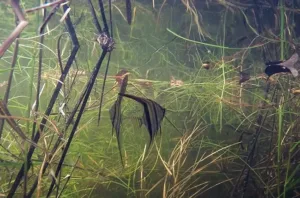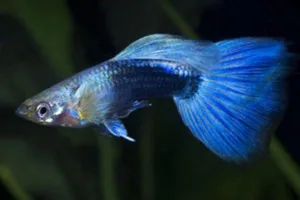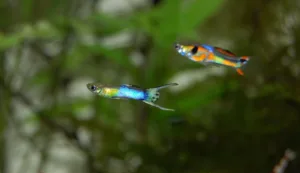One of the questions that often arises is, “Are guppies top swimmers?” In this article, we will delve into the fascinating world of guppies to answer this question and explore various aspects of their swimming behavior, providing you with expert insights and uncommon advice.
Are guppies top swimmers?
Yes guppies are considered top swimmers. They prefer to feed at the surface of the water and feed on bugs that fall into or swim on the top of the water like mosquitos. Are Guppies Easy To Take Care Of
Guppy Anatomy and Natural Habitat
To understand whether guppies are top swimmers, we must first look at their biology and natural habitat. Guppies, scientifically known as Poecilia reticulata, are native to freshwater streams, rivers, and pools in countries such as Trinidad and Tobago. In their natural environment, guppies are often found near the water’s surface, where they feed on aquatic insects, algae, and other small organisms. This tendency to stay near the surface has influenced their swimming behavior in aquariums. Are Guppies Tropical Fish: Everything You Need to Know
Buoyancy Bladders and Lateral Lines
Guppies possess buoyancy bladders, which are essential for maintaining their position in the water. These bladders help them stay afloat, and as a result, guppies tend to occupy the upper and middle regions of the aquarium. Their lateral lines, a series of sensory organs, also play a crucial role in detecting water currents and movements. This further encourages guppies to stay closer to the water’s surface, making them top swimmers.
Swimming Patterns of Guppies
Understanding the swimming patterns of guppies can provide valuable insights into their behavior. Guppies are generally classified as “active swimmers” due to their constant movement throughout the water column. However, their movements tend to vary depending on factors such as age, sex, and environmental conditions.
Age and Swimming
Guppy fry (young guppies) often exhibit erratic and playful swimming behavior, exploring different areas of the tank. As they mature, their swimming patterns become more purposeful and coordinated. Adult guppies maintain a consistent presence near the surface, which aligns with their natural habitat.
Sex-Based Differences
Male and female guppies also display distinct swimming behaviors. Male guppies are known for their vibrant colors and long, flowing fins. They tend to engage in more active and conspicuous swimming to attract the attention of female guppies. In contrast, female guppies, while still top swimmers, may display slightly less vigorous movements.
Environmental Factors
Water parameters and tank conditions can influence guppies’ swimming behavior. Proper water quality, temperature, and a well-maintained habitat are essential to ensure guppies’ well-being and encourage their top-swimming tendencies. Guppies tend to stay near the surface when water conditions are optimal. Are Guppies Schooling Fish? Unveiling the Fascinating Social Behavior of Guppy Fish
Interactions with Tank Mates
The presence of tank mates can also impact guppies’ swimming habits. While guppies are generally top swimmers, they may alter their behavior depending on the species they share the aquarium with. Are Guppies Aggressive? Unveiling the Complex Nature of These Popular Aquarium Fish
Community Aquariums
In community tanks with peaceful species like tetras, mollies, and platies, guppies are likely to maintain their top-swimming behavior without hesitation. These compatible tank mates create a harmonious environment that allows guppies to thrive in their natural swimming style.
Aggressive Tank Mates
However, when guppies share their space with more aggressive or territorial fish, they may adjust their swimming habits. In the presence of fin-nipping or aggressive species, guppies may swim lower in the tank to avoid confrontation. Providing hiding places and ensuring a well-balanced community can help minimize such adjustments.
Encouraging Top Swimming in Guppies
As guppy enthusiasts, it’s essential to create an environment that encourages and supports their top-swimming tendencies. Here are some expert tips to help you achieve this: Are Guppies Fin Nippers: Unraveling the Truth
1. Proper Water Conditions
Maintain ideal water conditions with a temperature range of 72-82°F (22-28°C) and a pH level between 6.8 and 7.8. Guppies are more likely to exhibit their natural top-swimming behavior in water that meets these parameters.
2. Adequate Tank Size
Provide an adequately sized aquarium to allow guppies ample space to swim near the surface. A 10-gallon tank or larger is suitable for a small community of guppies.
3. Aquascaping
Add floating plants like Water Sprite (Ceratopteris thalictroides) to your tank. Guppies enjoy swimming among the cover provided by floating plants, making them feel secure and encouraging top swimming.
4. Appropriate Tank Mates
Choose tank mates carefully. Opt for non-aggressive species that won’t disrupt guppies’ natural swimming behavior. Tetras, mollies, and platies are good choices.
5. Regular Feeding and Enrichment
Offer a varied diet and provide mental stimulation. Guppies enjoy chasing and hunting for their food, which can enhance their top-swimming activity.
Conclusion
In answer to the question, “Are guppies top swimmers?” the evidence is clear: yes, they are. Their natural habitat, anatomy, and buoyancy bladders all contribute to their preference for staying near the water’s surface. Guppies’ swimming patterns can vary depending on age, sex, and tank conditions, but they typically favor top-swimming in well-maintained aquariums.
Understanding and appreciating guppies’ top-swimming behavior is crucial for creating a thriving and enriching environment in your aquarium. By providing the right conditions and suitable tank mates, you can enjoy the captivating sight of guppies gracefully gliding near the surface, showcasing their vibrant colors and lively personalities.











